Daily Vocabulary Words: List of Daily Used Words in Leading International Newspapers
Hi there. Welcome to this special section @ Wordpandit.
Our endeavour here is very simple: to highlight important daily vocabulary words, which you would come across in leading newspapers in the country. We have included the following newspapers in our selection:
• The New York Times
• The Washington Post
• Scientific American
• BBC
• The Guardian
• Psychology Today
• Wall Street Journal
• The Economist
We are putting in extensive work for developing your vocabulary. All you have got to do is be regular with this section and check out this post on a daily basis. This is your repository of words that are commonly used and essentially, we are posting a list of daily used words. Hence, this has significant practical application as it teaches you words that are used commonly in leading publications mentioned above.
Visit the website daily to learn words from leading international newspapers.
WORD-1: Stagnant
CONTEXT: For millenniums before that, economic growth had been basically stagnant.
SOURCE: Not provided
EXPLANATORY PARAGRAPH: Stagnant means not moving or flowing, and often smells or seems dirty. It’s like when water sits in a puddle for a long time without moving, and it starts to collect mud and leaves.
MEANING: Having no current or flow and often having an unpleasant smell as a consequence (adjective).
PRONUNCIATION: STAG-nant
SYNONYMS: Motionless, still, inert, static, idle.
USAGE EXAMPLES:
1. The water in the pond was stagnant and covered with algae.
2. Economic growth has been stagnant for several years.
3. The discussions became stagnant and no longer productive.
4. He felt stagnant in a job that offered no progress or challenge.
WORD-2: Constellation
CONTEXT: It seems banal, but division of labor was part of a constellation of ideas that liberated our civilization from the savage grip of zero-sum thinking.
SOURCE: New york times
EXPLANATORY PARAGRAPH: A constellation is a group of stars that forms a pattern in the sky and is often named after its apparent form or identified with a mythological figure. It’s like when you connect dots to make a picture in a drawing book.
MEANING: A group of stars forming a recognizable pattern that is traditionally named after its apparent form or identified with a mythological figure (noun).
PRONUNCIATION: con-stuh-LAY-shun
SYNONYMS: Star cluster, asterism, celestial group.
USAGE EXAMPLES:
1. Orion is one of the most recognizable constellations in the night sky.
2. She enjoyed pointing out different constellations to her children.
3. Astronomers and navigators have used constellations to help guide their way.
4. The new constellation of satellites will improve global communication.
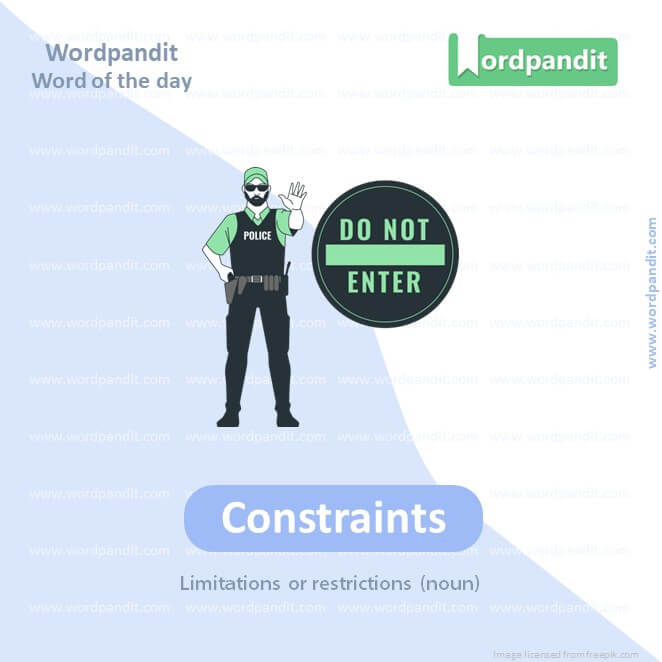
WORD-3: Constraints
CONTEXT: Once those informal, unwritten constraints are off, there is little that will stand in his way.
SOURCE: Guardian
EXPLANATORY PARAGRAPH: Constraints are like rules or limits that prevent you from doing everything you might want to do. It’s like when you’re playing a game where you can only step on certain colors on the floor.
MEANING: Limitations or restrictions (noun).
PRONUNCIATION: kuhn-STRAYNTS
SYNONYMS: Restrictions, limitations, confines, restraints, checks.
USAGE EXAMPLES:
1. The tight budget placed severe constraints on the project.
2. He had to work within the constraints of the law.
3. Time constraints made it difficult to finish the research on schedule.
4. The artist enjoys working within the constraints of traditional techniques.
WORD-4: Adherents
CONTEXT: They do not need a wide community of adherents to make themselves look like a movement.
SOURCE: New york times
EXPLANATORY PARAGRAPH: Adherents are people who strongly support a particular idea or leader. It’s like when you and your friends really believe in following the rules of a game you all enjoy.
MEANING: Someone who supports a particular party, person, or set of ideas (noun).
PRONUNCIATION: ad-HEER-ents
SYNONYMS: Followers, supporters, disciples, devotees, advocates.
USAGE EXAMPLES:
1. He has several thousand adherents around the world.
2. The party’s adherents were vocal in their support.
3. As a philosopher, she attracted many adherents to her way of thinking.
4. The movement gained adherents rapidly.
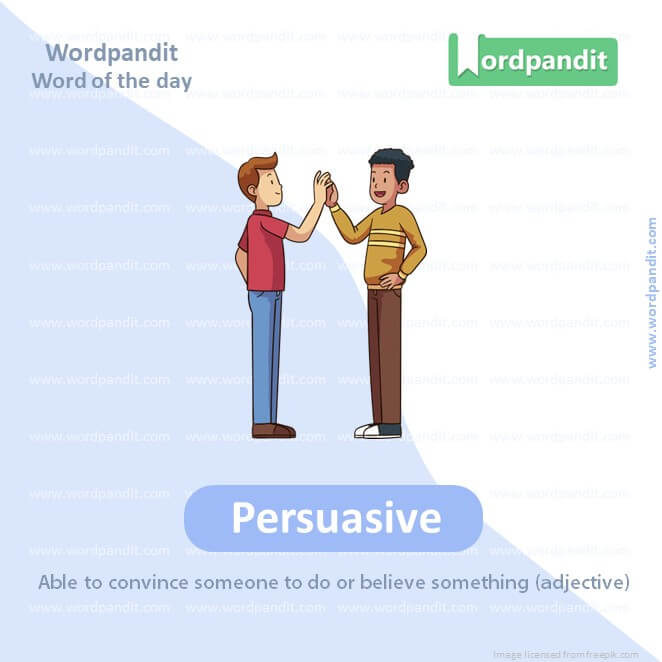
WORD-5: Persuasive
CONTEXT: She makes the persuasive case that even if he does not formally withdraw from the alliance, Trump can render it defunct simply by shaking confidence in its central commitment: that each member come to the defence of any other if attacked.
SOURCE: Guardian
EXPLANATORY PARAGRAPH: Persuasive means being able to convince someone to do or believe something. It’s like when you explain why it’s a good idea to share toys, and then your friend decides to share.
MEANING: Able to convince someone to do or believe something (adjective).
PRONUNCIATION: per-SWAY-siv
SYNONYMS: Convincing, effective, compelling, cogent, influential, eloquent.
USAGE EXAMPLES:
1. She gave a persuasive argument in favor of changing the policy.
2. His speech was so persuasive that many changed their opinions.
3. Persuasive advertising can significantly boost sales.
4. He wrote a persuasive essay on the need for environmental conservation.
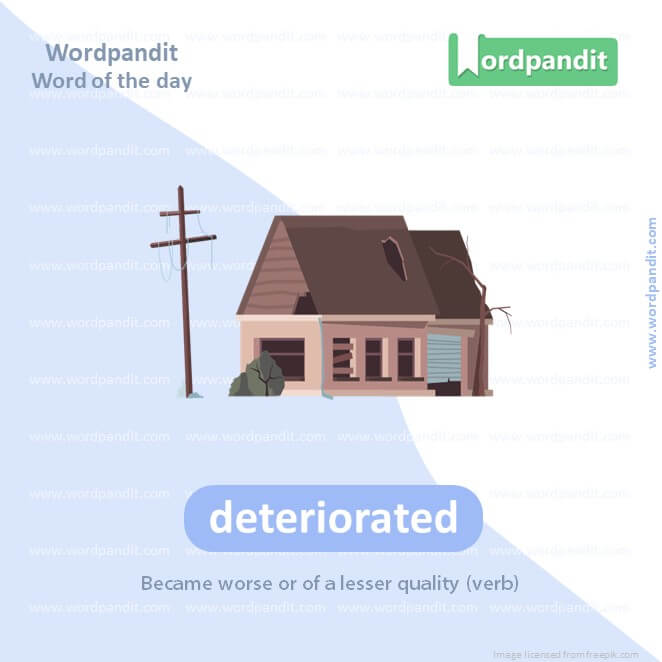
WORD-6: DETERIORATED
CONTEXT: He was also one of the architects of the rapprochement between Hamas on the one hand, and Iran, Hezbollah and Syria on the other, after ties had deteriorated in the wake of the Syrian war.
SOURCE: Guardian
EXPLANATORY PARAGRAPH: Deteriorated means something has gotten worse over time. It’s like when a toy starts to break after it’s been played with a lot.
MEANING: Became worse or of a lesser quality (verb).
PRONUNCIATION: deh-TEER-ee-uh-ray-ted
SYNONYMS: Worsened, declined, degenerated, decayed, degraded.
USAGE EXAMPLE:
1. The patient’s condition deteriorated overnight.
2. Due to lack of maintenance, the building has severely deteriorated.
3. Relationships deteriorated due to lack of communication.
4. The weather deteriorated just as they started hiking.
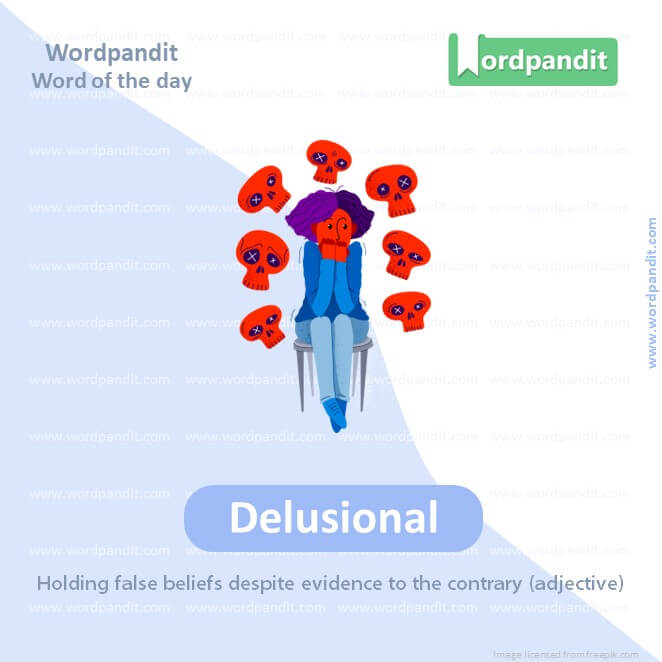
WORD-7: DELUSIONAL
CONTEXT: The go-it-alone fantasies of the Brexit era were always delusional.
SOURCE: Guardian
EXPLANATORY PARAGRAPH: Delusional means having false beliefs or opinions, even when they are proved to be untrue. It’s like when someone insists they saw a dragon in the backyard, even though it was just a big bird.
MEANING: Holding false beliefs despite evidence to the contrary (adjective).
PRONUNCIATION: deh-LOO-zhuh-nuhl
SYNONYMS: Mistaken, unreal, misguided, fanciful, irrational.
USAGE EXAMPLE:
1. The patient was suffering from delusional paranoia.
2. He had delusional ideas about becoming a famous movie star overnight.
3. Her accusations were found to be delusional and unfounded.
4. Delusional thinking can be a symptom of severe mental illness.
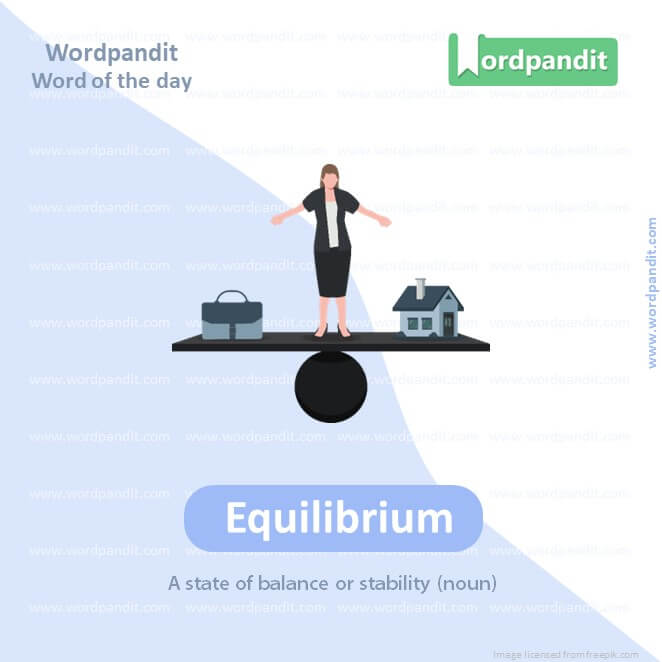
WORD-8: EQUILIBRIUM
CONTEXT: In its eyes, a clear response will be the only way to restore equilibrium.
SOURCE: Guardian
EXPLANATORY PARAGRAPH: Equilibrium is when everything is balanced and stable, like when you balance a seesaw so that both sides are equally off the ground.
MEANING: A state of balance or stability (noun).
PRONUNCIATION: ee-kwuh-LIB-ree-um
SYNONYMS: Balance, stability, parity, symmetry, poise, steadiness.
USAGE EXAMPLE:
1. The ecosystem maintains its equilibrium through various natural processes.
2. The market reached an equilibrium of supply and demand.
3. He struggled to keep his emotional equilibrium during the trial.
4. The balance of power helped maintain equilibrium between the two countries.
WORD-9: RETALIATION
CONTEXT: This would require a carefully measured retaliation that simultaneously signifies an escalation in terms of scope and intensity, but falls short of all-out war.
SOURCE: Guardian
EXPLANATORY PARAGRAPH: Retaliation means getting back at someone because they did something to you first. It’s like when someone splashes water on you, and you splash back.
MEANING: The act of returning an attack; revenge (noun).
PRONUNCIATION: re-TAL-ee-ay-shun
SYNONYMS: Revenge, reprisal, retribution, payback, counterattack, vengeance.
USAGE EXAMPLE:
1. The strike was a retaliation for the unfair dismissal of employees.
2. He warned against the cycle of violence and retaliation.
3. There was fear of retaliation if she spoke out.
4. The government’s harsh measures led to retaliation from the opposition.
WORD-10: EMBOLDENED
CONTEXT: The rest of higher education will find it harder. Networked, nationalized and emboldened, Rufo has nothing standing in his way.
SOURCE: New York Times
EXPLANATORY PARAGRAPH: Emboldened means to be given courage or confidence to do something. It’s like when your coach gives you a pep talk before a game and you feel ready to go out and play your best.
MEANING: Given the courage or confidence to do something (verb).
PRONUNCIATION: em-BOWL-dend
SYNONYMS: Encouraged, heartened, inspired, strengthened, fortified, spurred.
USAGE EXAMPLE:
1. They were emboldened by the success of the initial phase of the project.
2. The cheers from the crowd emboldened the team.
3. His mentor’s faith in him emboldened him to take on the challenge.
4. The favorable response emboldened the company to expand its operations.
Vocabulary Daily Words
Among the myriad aspects of language learning, the role of ‘vocabulary daily words’ attests to their undeniable importance. These everyday words form the bedrock of communication. Whether used in casual chat or formal discussion, the fluency and understanding of ‘vocabulary daily words’ can significantly uplift the quality of interaction. However, the vital question is, how to effectively learn these ‘vocabulary daily words’?
The crux of learning ‘vocabulary daily words’ lies in a well-rounded approach that encompasses exposure, understanding, memorization, and practice. Rote memorization might seem like a quick solution, but it lacks context and, thereby, retention. Hence, opt for a diverse range of resources like books, newspapers, podcasts, and digital media. These will bring ‘vocabulary daily words’ to life, providing real-life usage examples and making the learning process inherently engaging.
Next, using memory-enhancing techniques can significantly improve retention of ‘vocabulary daily words’. Techniques such as flashcards or the Leitner System align with the principles of spaced repetition, allowing more effective and long-term learning. Incorporating mnemonic devices, associating new words with unique stories or images, can further facilitate this learning process.
The key to fully grasping ‘vocabulary daily words’ lies in practical usage. Make it a habit to use these words in your daily communications. Whether it’s a friendly conversation, a professional email, or a social media post, try integrating these new words. Doing so provides hands-on practice, strengthening your comprehension and application of these words.
In a nutshell, ‘vocabulary daily words’ are a treasure in the language learning landscape. By harnessing diversified resources, utilizing memory techniques, and actively using these words, your grip on the ‘vocabulary daily words’ will strengthen significantly. So, turn the pages, hit play, start a conversation, and let these ‘vocabulary daily words’ shape the story of your linguistic journey.







